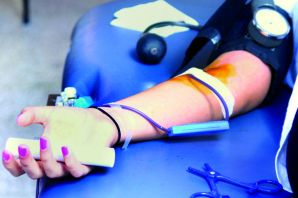The nursing staff and the American Red Cross hosted a blood drive in Grace Hall on Friday, Oct. 29, which assisted in giving blood to many people in the area and around the country.

Cabrini has been conducting blood drives for over 25 years. This year the goal for the blood drive was 60 units of blood and Cabrini collected 45 units of blood, which is down from most years.
“The 45 units collected, while short of the 60 unit goal, is still a great success and close to other fall drives. Your blood is being used right away. The need for blood is constant,” Susan Fitzgerald, Cabrini nurse, said.
The process for donating blood is simple: registering and reading an informational package about donating. The nurse conducting the donations gives donors a questionnaire about medical history. If the donor is cleared, the person donates blood. After donating the person is given a snack and leaves. The process usually takes five to 17 minutes.
“Each donation saves three lives,” Donisha Jackson McCrea, American Red Cross nurse, said.
College students are at a high percentage for donating blood because they are younger and in better health. Freshmen students are also prone to give blood more than older students because in high school there are so many stipulations in giving blood.
“They stuck a really long needle in my arm and I was terrified but afterwards I calmed down and now I am proud I got to save lives,” Monconjay Brown, freshman undeclared major, said.
Some people came out to give blood but were told they couldn’t donate for many reasons. Some became nervous and their heart rate rose or their hemoglobin level was low.
People also couldn’t donate if they recently got a tattoo and were not aware that in a non-licensed state you have to wait a year to donate blood. In non-licensed states the state doesn’t come by and check the facility.
“I tried to give blood but got a tattoo over Labor Day weekend so couldn’t. I will try again in the spring blood drive,” Kayla Tindal, sophomore criminology major, said.
Another component for a person giving blood is testing them for HIV. Most people think that if you have low iron or high blood pressure and are taking supplement pills you cannot donate but on the contrary the person can donate. There are different categories for blood components. Plasma can be stored for one year, red blood cells can be stored for 42 days and platelets can be stored for five days.

Fitzgerald said every two seconds someone needs a blood transfusion. Blood will never be kept for a long period of time because it is always needed.
The American Red Cross hosts blood drives seven days a week all over Pennsylvania and New Jersey but also has efforts across the world.
The Red Cross put out a press release stating, “The Red Cross is activating its emergency plans in Haiti, with government officials describing Hurricane Tomas as potentially the gravest hurricane threat to the country since Hurricane Ike in 2008.”
“I always donate blood because it is my volunteer services but I donated it now because of the horrible things happening around the world,” John Eddings, freshman biology major, said. “There is a chance my blood will help people across the world.”


